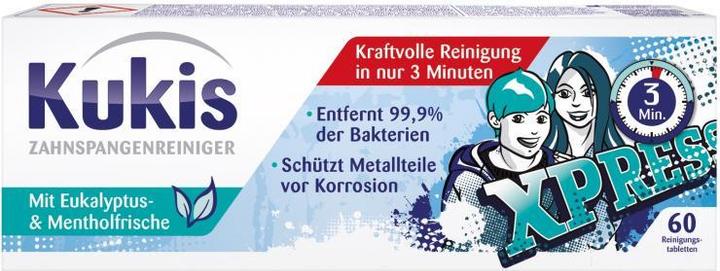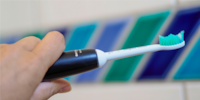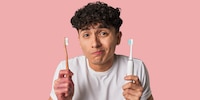

How to clean your braces properly
If you wear braces, you need to keep your mouth and metal clean. While the loose models don't like heat or toothpaste, the fixed braces require you to be particularly meticulous around the edges of the brackets.
Brush your teeth properly once a day. Actually, reveals Dr Claudius Wiedmer, Swiss orthodontist and board member of the Swiss Society of Orthodontics, that would be enough. However, as a doctor, he does not usually advise this because it is like driving a car: If the speed limit is 30 km/h, people drive 50 km/h. If the speed limit is 50 km/h, they drive even faster.
Translated to dental hygiene, this means: it is better to recommend brushing your teeth two or three times a day, then you will end up brushing once or twice. Humans are lazy and don't do annoying things more often than they absolutely have to.
But braces wearers shouldn't be lazy at all, because with fixed brackets or even loose braces, you need to pay more attention to oral and dental hygiene than usual.
With or without braces: what's important when brushing your teeth
If technology can help, then bring it on. This also applies to brushing teeth. The tenor of the industry: it's better with an electric toothbrush. Why? The vibrations in the ultrasonic range are good at removing plaque down to one millimetre. You can also reach your teeth better with the often small brush heads. And of course, you can also use the electric toothbrush with braces.
However, if you are a fan of manual brushes, we recommend using a special braces brush for people with braces. These are usually labelled "Ortho" and have a small recess or groove in the centre of the head, which makes it easier to reach the teeth with brackets.
Fluoride is an irritating word for some people, but the effect and necessity for healthy teeth is undisputed among researchers. Therefore, make sure that your toothpaste contains fluoride in the ingredients and that your mouthwash also contains fluoride if necessary. "If you have braces and can't always clean them perfectly - because everyone has their weak points - it's good if at least the toothpaste contains fluoride. This is because it penetrates the plaque and so less tooth decay can occur," says Dr Wiedmer.
Clean properly: The loose braces
In principle, you don't need to brush your braces (whether fixed or loose) more often than your own teeth. This means two to three times a day for about two to three minutes. In particular, please don't forget to brush your teeth in the evening.
Take the loose braces out when brushing and clean them separately from your teeth. Brushing with a brush and a little water is usually enough. You can also soak your loose braces in a special solution for around 10 to 15 minutes if you want them to taste and smell particularly fresh. However, Prof Dr Bertl from the Department of Orthodontics at the Sigmund Freud Private University in Vienna advises against an obvious cleaning ritual: "Toothpaste should be avoided because the abrasive cleaning agents in toothpaste tend to roughen the plastic surface of braces and therefore further favour the build-up of new plaque."

Loose braces are now available in many variants, but the classic model is still the plastic model with an adjustment option on the palatal plate. Depending on the design, these can be kept in the mouth while eating, but they often come out during meals at the latest. It is then important to store it appropriately, preferably in its own box, so that it does not get lost or accidentally climbed on. After eating, you should brush both your teeth and your braces. Make sure you don't put too much pressure on the wires, otherwise they could bend. Once you have finished brushing, you can put them back in.
The only difficult part to clean is the space with the screw for adjusting the braces. Here you can work with toothpick-like brushes, so-called interdental brushes. Ultrasonic cleaning at the next check-up appointment at the latest will help with coarser soiling. If you have an ultrasonic cleaner for cleaning jewellery at home, you can also do this at home.
Expert Bertl summarises the no-gos when cleaning loose braces as follows: "Avoid heat as much as possible. Some types of removable braces tend to deform when exposed to high temperatures. So don't put braces in the dishwasher, don't boil them and don't leave them on the windowsill in the sun. You should also protect loose braces from pets, as they often find the odour very interesting ..."
Clean properly: The fixed braces
With fixed braces, there are usually metal brackets and brackets in the same colour as the teeth - either made of plastic or ceramic. However, the two more discreet models only have a visual advantage. When it comes to the care of fixed braces, expert Wiedmer recommends the standard metal model. The reason: the plastic version can potentially become discoloured by red wine, curry and other foods. Ceramic, on the other hand, does not discolour - but the rubber edge of the brackets certainly does. Ceramic is also more sensitive and breaks more often than metal brackets.
When brushing your teeth, you should make sure to thoroughly clean all the edges of each individual bracket, because: "Damage to the tooth surface practically never occurs under a bracket, but always at the edge," says expert Bertl. "This is where food debris and plaque can accumulate particularly well and - if they are not removed regularly - lead to so-called whitespot lesions: milky white spots on the tooth surface."
The wires between the brackets are always slightly thinner at the beginning of the braces phase, which is why you should apply less pressure here to prevent them from being damaged. Over the course of the braces phase, thicker wires are then also used, which means you can exert more pressure.
Fixed braces are often accompanied by a retainer, a thin, fixed wire that holds the lower front teeth in position from behind. This is usually worn over a very long period of time, even beyond the braces. You can use interdental brushes to clean the spaces between the teeth as well as between the retainer and the teeth. And even if you can't get through, that's no problem. It's just important that you brush the rest well. Otherwise, there's always the cleaning appointment at the orthodontic practice.
Digital support: app for progress selfies
The majority of children and teenagers wear braces - and the free "SwissOrtho App" from the Swiss Society of Orthodontics (SGK/SSODF) may be of interest to them and their parents: It contains helpful instructional videos, for example on flossing with braces or how to attach the elastics to the brackets, as well as information on typical emergencies such as "A bracket has fallen off" or "The wire is pricking". Selfie collages can also be created to visualise the positive development of the straightened teeth. The reminder service for check-up appointments for braces is a practical feature.
Cover photo: shutterstock
Notebook, camera, laptop or smartphone. For me, life's about taking notes – both analogue and digital. What's always on me? My iPod Shuffle. It's all in the mix, after all. This is also reflected in the topics I write about.
Practical solutions for everyday problems with technology, household hacks and much more.
Show all

